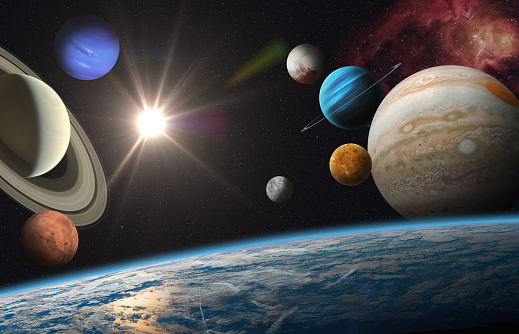
Nine worlds grab hold of your mind.
Nine worlds grab hold of your mind.
When analyzing a birth chart, Vedic astrologers mainly use nine celestial bodies as reference points. Here are their names in Sanskrit and English, and the classical order they are listed:
2. Chandra (the Moon)
3. Mangala (Mars)
4. Budha (Mercury)
5. Guru (Jupiter)
6. Shukra (Venus)
7. Shani (Saturn)
8. Rahu (North Node)
9. Ketu (South Node)
To somebody totally unfamiliar with the subject it might first stand out to them that the Sun and Moon are not “planets” in the astronomical sense. Rahu and Ketu likewise are not planets, and in fact are not even real objects—they are mathematical points in space. But astrologically all of these objects have functions that make them worthy of a conceptual grouping. This is easier to appreciate if we can learn from the Indian spiritual tradition. In Sanskrit the word we commonly translate as “planet” is graha. This is related to the English word “grab.” So the short answer to the question that headlines this essay is that the planets are the entities that grip each individual to their life on Earth.
But what part of oneself is seized in this way, and what is the “life” being referred to?—for if we were dealing solely with material processes, surely the study of biological science would be adequate in helping us to understand what we’re doing here on Earth. Many people, except the most rigid skeptics, know intuitively that this can’t be the case. There is a mental substance, or mind, that exceeds the boundaries of one’s body, riding it like a vehicle. Through the actions of the body, the mind gathers experiences which becomes habits. All of these things together: the actions we perform, the intentions that motivate them, and their results in the world of experience form what we call karma.
The nine grahas deliver the results of karma at the proper time in each individual’s life. They both activate and deactivate certain intentions in a person’s mind in order to direct their attention to the experiences they need to evolve. You don’t always receive the effects of your actions immediately because they are building up to a threshold on these other worlds. If at the time of death a person has unresolved karmas, that are unfulfilled desires and unsatisfied habits, they are born again into exactly the conditions necessary to help them finish. This cycle might go on an indefinite number of times as long as new habits are created, but it is not meant to last forever.
We must not treat these ideas as distant abstractions. You can feel each of these planets individually by knowing what they control. My favorite example is Mars. One of the experiences Mars controls is anger. Everyone has been angry at some point in life. This primitive emotion is not just a spontaneous vibration of your nervous system. Anger is a resonance between your body and the motions of the red planet flying through space. It is an echo of the relationship you had to that planet at the time of your birth. Is the anger identical with Mars? No—Mars is where the anger is stored between outbursts. Thanks to Mars, you experience a rhythmic and structured evolution of your relationship to anger. The mission of Mars is for you to direct your anger away from petty squabbles and towards only the most important battles in life.
This view, that the planets are wise agents with a mission for your life is shared in the second chapter of one of Vedic astrology’s most authoritative text, Brihat Parashara Hora Shastra:
“The unborn Lord has many incarnations. He has incarnated, as the 9 grahas to bestow on the living beings the results due to their Karmas. He is Janardan*. He assumed the auspicious form of Grahas to destroy the demons [evil forces] and sustain the divine beings.”
The nine planets are incarnations of something supreme and have a very purposeful relationship to you and everybody you know. They have been delegated the task of guiding you away from “evil”—even when, paradoxically, they lead you to experience it. These experiences are always echoes of your past actions. You may experience difficulties in life in order that you really appreciate what actions to avoid. When we resist the temptation to do something hurtful or selfish, then we reduce the necessity of having to experience the perils of such actions in the future. Conversely when we cultivate positive habits like generosity, the results are experiences that lead to peaceful states of mind. The fact that all these results, pleasant, painful, or neutral, are stored on these massive orbs in space gives new meaning to the term “ethical weight.”
Of course I don’t intend this essay to be a moral diatribe. What I desire for my practice is to help people feel more at home on Earth, and I believe that starts by evolving our understanding of what happens on the largest scales of reality. Your mind is under the care of powerful and intelligent agents. Feel how they rise and fall in influence through the tides of your intentions and emotions. How do the flavors of your experiences change from day-to-day? This is the influence of the 9 grahas seizing your mind.
Although it's helpful to think of the planets as living entities, we shouldn't think they or anyone is really out there judging you. They absorb the effects of your habits to protect you from your worse outcomes. The outcomes in the world of experience are repercussions of the past. The planets have to slough off the karma you stored in order to make room for new habits. These rules are not totally deterministic—for so long as you are present and alive to whatever you’re experiencing in the moment, how you react to this guidance is a matter of choice.
*Janardan is one of the names of Vishnu. It has a variety of translations, a very common one being "He who helps/protects people."

